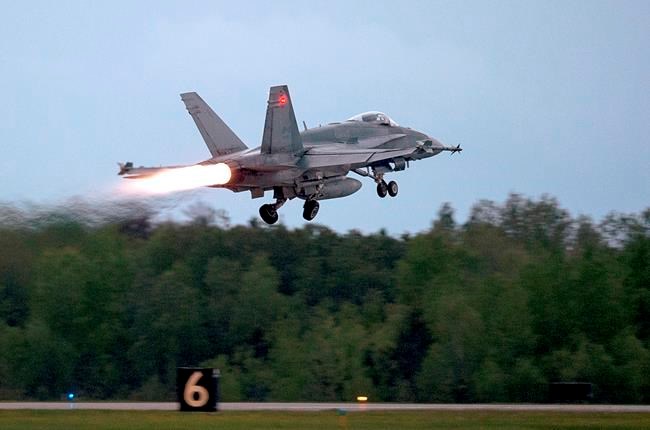OTTAWA — COVID-19 is presenting another challenge to Canada's long-running and tumultuous effort to buy new fighter jets.
The federal government last summer launched a long-awaited competition to replace the Royal Canadian Air Force's aging CF-18s with 88 new fighter jets at an estimated cost of $19 billion. The move followed a decade of controversy and mismanagement by various governments.
The three companies still in the running are supposed to submit their bids at the end of June and, despite the pandemic, the federal procurement department insisted in an email to The Canadian Press that it still expects them to meet that deadline.
The three companies vying for the lucrative contract are Lockheed Martin and Boeing from the U.S. and Sweden's Saab. Lockheed Martin builds the F-35 while Boeing is pitching its Super Hornet and Saab is offering its Gripen jet.
Yet while representatives for the three companies say they are likewise plugging away at their respective proposals, a senior Boeing executive left the door open to asking the government for an extension as COVID-19 forces the company to adjust how it does business.
"It's challenging, there's no question about it," Jim Barnes, the Boeing executive responsible for trying to sell the company's Super Hornet jet to Canada, said in an interview on Tuesday.
"We want to make sure we put the most competitive offer on the table for the government of Canada to evaluate and we feel like we can put a very compelling offer. If we feel like we don't have time to finalize that competitive offer ... we would certainly ask for an extension."
The government has already approved one extension to the competition since it was launched last July. Companies were supposed to submit their final bids at the end of March, but were given three more months after Saab asked for more time.
Boeing continues to work closely with the U.S. government and navy on its bid and hopes to meet the current deadline, but Barnes said the pandemic has slowed things down as many staff work from home on a complex project with significant security considerations.
"Then you have to take into consideration the health of your subject-matter experts in those areas where there are just a few people that can really work up those responses," he said.
"Those kinds of things we're dealing with. I'm not sure if the other teams are dealing with that, but we are monitoring that and if we feel like we can't meet the deadline, we'll certainly consider an extension request as an option."
Representatives for Lockheed Martin and Saab were more confident in being able to meet the current deadline.
"Lockheed Martin remains prepared to provide a comprehensive proposal for Canada's future fighter capability project competition," Lockheed Martin Canada chief executive Lorraine Ben said in a statement.
"We have not requested an extension of delivery for the FFCP preliminary proposal and we are excited to share more about the F-35's ability to strengthen and modernize defence, enhance ally partnerships and contribute to economic growth in Canada."
Saab Canada president Simon Carroll expressed similar sentiments, saying in an interview that while there some challenges in preparing a bid during a pandemic, "we're certainly working towards that and are planning at this point in time to submit in accordance with that deadline."
Yet there are also questions about the government's ability to move ahead on the project even if the companies do get their bids in on time, given the majority of federal employees are working at home.
"Those submissions are going to have a combination of sensitive and classified information, and handling all that with a workforce, the majority of which is working from home, is going to be more difficult," said defence analyst David Perry of the Canadian Global Affairs Institute.
"I think as a basic bottom line, it is completely illogical to think that the impacts of COVID-19 won't be running through the entire suite of defence procurements because you can't work as efficiently with a huge chunk of your workforce at home."
This report by The Canadian Press was first published April 21, 2020.
Lee Berthiaume, The Canadian Press




